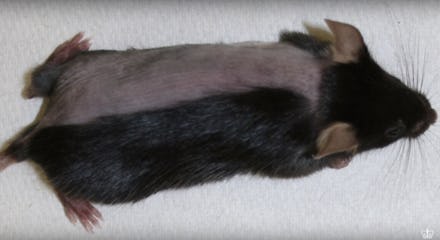Columbia University Found a Way to Regrow Hair on Mice — And It Could Work on Humans

Researchers at Columbia University have found a way to treat hair loss caused by an autoimmune attack in mice that may lead to an eventual cure for pattern baldness in humans, according to a study published Friday in Science Advances. The current findings are the first to provide "rapid and robust hair growth" in the studied mice, researchers from the Columbia University Medical Center report.
"There aren't many compounds that can push hair follicles into their growth cycle so quickly," study author and Columbia researcher Angela M. Christiano said in a statement. "Some topical agents induce tufts of hair here and there after a few weeks, but very few compounds have this potent an effect so quickly." While previous studies have managed to activate hair growth in mice with damaged or dormant hair follicles over a matter of months, the Columbia's findings seem to be the first of their kind to produce such fast, robust results in less than one month.
The researchers uploaded a video to the Columbia medical YouTube channel Friday to coincide with their findings:
How it works: The researchers gave mice oral doses of a drug that hinders a group of enzymes found in hair follicles called Janus kinase, or JAK. Blocking JAK enzymes from functioning allowed for quick hair growth in areas on mice where hair has been lost to autoimmune attacks like alopecia areata, which can occur in both men and women — particularly when the hair follicles are damaged by things like tight braiding and man buns. According to the study, the JAK-inhibiting drug seemed to awaken hair follicles that had been turned off and weren't producing any hair for some time.
However, the fastest results came when the team applied the drugs topically to mice. Following three weeks of consistently applying the drug to just one side of the body, the mice regrew their hair almost entirely.
No miracle cure just yet: Although the drug has proven effective in both lab mice and some members of a group of people with alopecia areata tested by the Columbia researchers, the study notes the team hasn't found a cure for baldness just yet.
"What we've found is promising, though we haven't yet shown it's a cure for pattern baldness," Christiano said in the statement. "More work needs to be done to test if JAK inhibitors can induce hair growth in humans using formulations specially made for the scalp."
So, while the JAK inhibiting drug may not be the miracle hair loss drug people battling baldness had hoped for, it's another step in the right direction. "Our findings open new avenues for exploration of JAK-STAT inhibition for promotion of hair growth and highlight the role of this pathway in regulating the activation of hair follicle stem cells," the Columbia researchers noted in the study.